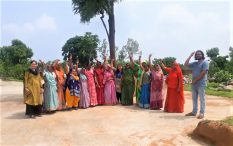The MTCP2 Supervision and Implementation Support (SIS) Mission team India interacted with SEWA’s farmers group–Swashrayi Mahila Khedut Mandal–at Aravali District, Gujarat on 17 July 2019. Their visit to SEWA’s RUDI Processing Center enabled them to gain an in-depth understanding of RUDI, SEWA’s Agri-Commodity Value Chain which is owned and managed by farmers. The SIS Mission team was taken through the entire process of order booking and execution through the RUDI Sandesha Vyavhaar (RSV) App – RSV is an example of integration of technology into agriculture.
The team also had a brainstorming session with farmers in order to find out about the challenges they face, their needs, and how they foresee the future of agriculture 5 years down the line.
SEWA Senior Coordinator along with the SIS Mission team interact with the farmers at Dungarpur District, Rajasthan on 18 July 2019 to find out how they combat water scarcity in agriculture.
After the submission of reports collating the outputs, outcome and impact of the Medium Term Cooperation Program – Phase II (MTCP2) by all partner farmer organizations in India, selected partner FOs collectively reflect on the impact of the programme in their respective organizations during the MTCP2 India Impact Assessment and Transition Planning Workshop held on 19-20 July 2019 at the Ahmedabad Management Association. The learnings from this workshop will facilitate implementation of the next phase.
In the first half of their last day in Ahmedabad, the Indian delegation of the SIS Mission team gained an understanding from Lany Rebagay, MTCP2 Programme Manager, about the new phase of the Programme–the Asia Pacific Farmers’ Program (APFP), and how the MTCP2 will transition to the APFP.
The second half was spent at the Annual General Meeting (AGM) of the SEWA Trade Facilitation Center, a company where marginalized artisans themselves are the producers, owners, shareholders ,and managers. These artisans are basically small and marginal farmers who are unable to manage their living expenses from agriculture solely because of natural calamities like drought, and hence have turned to traditional crafts as a source of supplementing their income.
Padmashri Lailaben Tyabji of ‘Dastkar’ (a NGO working for the revival of traditional crafts in India) and Shilpaben Sharma of ‘Jaypore’ (a premium online store that focuses on traditional Indian handicrafts) were the guests of honor at the AGM.



















Comments are closed